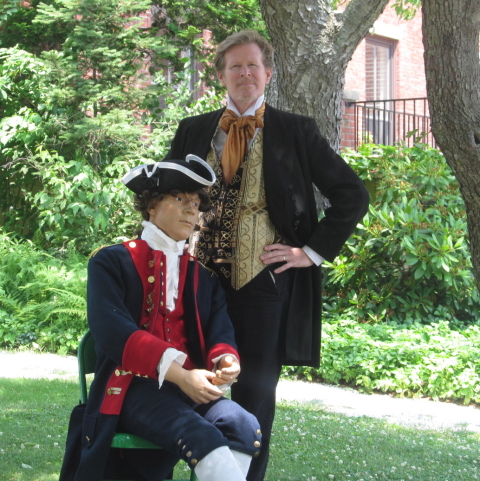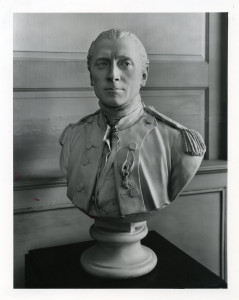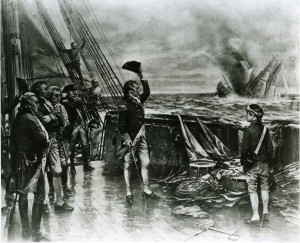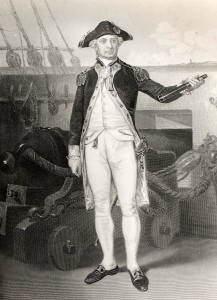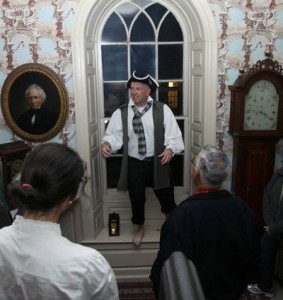John Paul Jones – So You Want to be a Rock Star!
John Paul Jones – So You Want To Be a Rock Star!
It is really hard to be a rock star 200 years before rock n’ roll was invented but John Paul Jones, best known to be the father of the American Navy, managed to do just that. He had all the qualities of a rock star long before there was an electric guitar, an amplifier or an outlet to plug into. Both men and women wanted to be him, wanted to emulate him and wanted to be near him. Unfortunately, their jealousy kept them from adoring him. Well, not everyone.
Women loved him and fawned all over him and he might be the first sailor to have a girl in every port. He had a swagger; he was good looking and brash in his dealings with the public and did things in his own way. He was misunderstood and like most true rock stars he had a turbulent and scandalous past. Though it was never portrayed in a portrait you can almost imagine him with a pouting sneer that would drive women wild. Women do love a bad boy and John Paul Jones was bad to the bone. Or at least some people thought so!
No one in history evokes such debate as this Scotsman who showed the world how a Navy could best be used in battle. For most countries ships were mostly used to haul cargo and when it came to the military naval officers were usually using their station as a stepping-stone for something better. No one ever actually wanted to be a ship’s captain as it was merely a rung in a social ladder that would hopefully end in a political appointment. Jones changed all of that with his daring and courage and with change comes resentment.
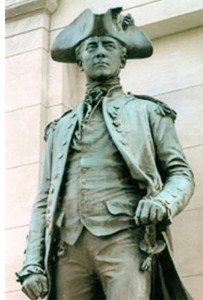
John Paul Jones was quite the ladies man hand a bad boy in his day – most women wanted to give him a bust in his mouth!
He is regarded as the father of the American navy yet he was treated badly at almost every turn by his adopted country. Where the British feared him and used every opportunity to use his past discretions as an opportunity to degrade him, it was still true that most of Europe realized his true skill and his real value. The same could not be said in his adopted country of America where he was often not paid, given a medal and a pat on the back rather than an appointment and eventually had to leave his beloved America to find a job. Unfortunately, when he eventually landed in Russia he found more than a career – he found scandal.
Paul Jones was accused of raping a young girl in Russia though for the most part the accusation was considered to have been the plotting of some other jealous seaman who did not like Paul Jones getting all the attention from the Russian Court. True or false the accusation did virtually end his career there and though many doubted the accusation the scandal did stick with him. If you can’t think scandal can stick just ask Eliot Spitzer.
Let’s not forget, as with any rock star there are always a string of women who had him in the sack and a host of women who missed their opportunity and were willing to do anything to get back at the man who slighted them. In truth, the accusation of rape could have been true even though there is nearly a shred of evidence to convict him but when you spend as much time taking off your pants as putting them on there are bound to be some indiscretions.
Now it should be mentioned that his families last name was Paul and that nowhere in the family history does the word Jones appear. Using a “stage name” is nothing new to stars as most people would know the name of actor John Wayne and not his given name of Marian Morrison, but stage names were not usually used in the 1700s – unless you had something to hide. Unfortunately, personal managers and press agents were not available either in the 1700s but more on that later.
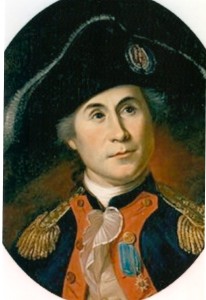
John Paul Jones was the founder of the American Navy but most people these days hear the name and think of the bass player for Led Zepplin!
Like most rock stars Paul Jones was from modest beginnings, was probably misunderstood and only had music to console him – well perhaps not. Paul jones was born in Kirkbean, Kirkcudbright on the southern coast of Scotland on July 6, 1747. Far from wealthy the family lived in a small cottage on the estate where his father was a gardener. He went to school like most other boys and at the age of 13 was ready for a life at sea. Paul Jones was not driven or called to the sea, which would add a bit more flavor to the myth, as this was a pretty usual direction for young boys who wanted to get out of Dodge, or in this case Kirkbean.
John Paul, still a teenager, found himself on his first ship the Friendship, an ocean going vessel of 28 men, which was part of the now hated “triangle trade”. For three years he crewed on the ship that would bring consumer goods to Barbados, would trade them for rum and sugar then go off to Virginia where they would be traded for tobacco and slaves. Yes, the father of the American Navy worked on a slave ship. Scandal number one!
After the French and Indian War ended recession hit and he lost his job along with the rest of the crew. Believe it or not recessions happened outside of the twentieth century. He became third mate on the King George at 16 years old and found himself once again hauling slaves. It’s not what he wanted to do and it was only considered immoral centuries later but it was probably better than slinging fries at Ye Olde McDonalds.
John Paul stayed on ship for two years before becoming first mate on the ship Two Friend. Though we do not know why and we can probably doubt that he had a moral epiphany but he resigned and would never work on a slave ship again. Of course, after working in the slave trade for almost six years it could hardly be referred to as a passing fancy but rather it was a stain that would haunt and undermine his legacy to this day.

Every year a birthday celebration is held at the John Paul Jones House (which he never owned) complete with a military attachment!
His next ship was the John, a brigantine where he hitched a ride home back from Jamaica; unfortunately that trip was fraught with disaster. Both the captain and the first mate died of fever so being the presumptuous teenager he was he took over and captained the ship back. The owners were thrilled and made him captain for two voyages before he landed his next gig captaining the three-masted Betsy, a half worn ship that proved to be more of a problem than a joy. Here was the brewing of Scandal number two!
Apparently the crew felt they were being misused and a brawl was about to erupt over a pay issue when the leader of the gang attacked Paul Jones with a club. In his own defense Paul Jones ran the braggart through with his sword. Not about to trust the local police in Tobago, John Paul needed a plan. At the urging of his friends and in the hopes of saving his own hide he added the surname of Jones. No it didn’t change his name because it looked better on a marquee (though it would) but merely to fool the police. After all the police of Tobago were looking for a killer named John Paul, not John Paul Jones. Changing your surname because your old one the police are looking for because of a murder? Definitely scandal number 2!
Now at this point some may argue that JPJ was merely a product of his upbringing or that he was pushed to make some rash decisions because of some sticky situations. True, he did kill a man but many believe it was in self-defense and doesn’t a man have the right to defend himself when his own life is at stake? Could this be the first case of the “stand-your-round” law? Though Jones was never a member of a neighborhood watch he did feel his life was in danger and how did he know his attacker did not have a weapon? Sounds like an open and shut case (well, at least in Florida!)
A man has to do what a man has to do and doesn’t a man have to eat and shouldn’t a day’s work be rewarded with a days pay? Of course it should. JPJ has always walked the line between being respectable and scandalous; it’s his choices that leave so much room for debate. All we know for sure is that by the age of 20 he had worked in the slave trade for more than 5 years and changed his name to avoid a murder charge. The closer we get to the Revolutionary War, where he really made his name, the more he sounds like a rock star.
Jones offered up his services to the Continental Navy in 1775 where he captured several merchant ships and plundered them. Now most officers did this as a matter of course but it is here that Jones gets his reputation for being a pirate. Jones was actually a privateer, which means that any ship that was deemed to be an enemy of the state could be attacked, captured and plundered. Everyone was doing it; Jones just got the bad wrap for it. George Washington however was quite pleased with Jones and did not understand what all the fuss was about.
War is usually about the other guy having something you want whether it be freedom, land, taxes or in this case clothes. George Washington, the father of our country, saw Jones quite differently than everyone else mainly because Jones had something Washington needed. You see Washington may have been swayed because when Jones looted, I mean captured, the Mellish, whose cargo was 10,000 winter uniforms, Washington took notice. Jones literally took the shirt off of other people’s backs and gave them to Washington whose troops were freezing at Valley Forge. You can’t argue with a free set of clothes when you are freezing to death.
For the next few years Jones attacked and pillaged anything that floated as he continued to add to his bad boy reputation. His crews almost always hated him as much as the enemy as he kept their share of there plunder to a minimum leading to much discord amongst the ranks. If you would argue with that just consider how you felt when you heard of the CEO’s of Wall Street getting bonuses of hundreds of millions of dollars after destroying our economy. Though some feel they and he deserved what they got don’t you also believe that there was plenty to go around?
One of Jones’ first mates Elijah Hall was fed up about being cheated and mistreated and he was ready to do something about it. Hall actually wrote to John Adams and Benjamin Franklin asking that Jones be striped of his command. Hall also wanted Jones to be put on trial for his apparent abuses but Jones proved to be a bit too slippery. Jones could avoid a trial as well as Michael Jackson could avoid a molestation conviction. Unfortunately for Hall, Jones was much too valuable to the war effort. The British hated him for all the damage he caused and though his American sponsors didn’t much care for him either due to his ego driven personality they knew they needed him.
Jones of course was fast climbing the ladder to success and he was about to be provided the vehicle for that ride. The Ranger, an 18-gun Continental Navy sloop that was originally called the New Hampshire, was built for him by John Langdon (soon to be governor) in Portsmouth. On this ship he would head for the Irish Sea, make a raid on the British port of Whitehaven where he blew up the fort and set the ships in the harbor ablaze. It was his first toy ship and the Atlantic became just one huge bathtub where he played the game Battleship.
In 1778 it was thought that he committed his worst crime ever: worse than murder, piracy or working as a slaver. He broke the laws of being a gentleman. It turns out that Jones crew wanted a bigger piece of the pie so when they attacked the mansion of Earl Selkirk he allowed his crew to “steal the silver” thinking nothing of it. Jones really wanted to kidnap and ransom the Earl but since he was not home his crew chose to steal the silver instead. Later public disapproval turned against Jones for the breach of etiquette and he later went to great pains to return it. Though he made amends the incident appeared to be that of a rock star trashing a hotel room. Scandal number three!
“I have yet begun to fight”, are probably the most famous cries to action that have come out of any war and Jones spoke them, or was said to speak them, in 1779 in a battle that would serve to be one of the highlights of his career.
Jones captained the Bon Homme Richard, a large ship renamed to honor Benjamin Franklin after his Poor Richard’s Almanac that after a battle was on its way home for repairs. On its journey home it encountered the Serapis, an armed British vessel. It was a fierce four-hour battle, which killed nearly half of both forces. Serapis, the more heavily armed ship that was also providing escort for 41 other merchant ships, used its firepower to nearly destroy Jones ship. When the captain called for Jones to surrender was when he uttered his now famous line.
The battle lasted and in true Energizer bunny fashion seemed to go on and on. In truth, both ships were actually sinking when Jones lashed the two ships together. Despite several attempts to board the Serapis they were repulsed each time. It was one of Jones’ crew who really won the battle when he threw a bag of grenades aboard the enemy ship, which ignited the stored powder. Shattered the Bonhomme Richard could not be saved and eventually sank. Jones sailed the captured Serapis away for repairs. And though he lost the fight his valor convinced the French to join the Americans in their fight for freedom. The legend was born and after the battle Jones was considered almost unstoppable.
So why did Jones never get his due? Perhaps the attributes that made him such a good sea captain were the same that made him so unpopular. It is the same sort of admiration/repulsion that make women watch beauty pageants every year – just so they can hate the winner. Jones was cocky, arrogant and had very strong ideas about how a crew should be lead and how a captain should be treated. Most of his crews hated him and his first mate Elijah Hall went so far as to pen a letter to not only strip Jones of his command but to bring him to trial for his mistreatment of the crew. It would seem that everyone hated to love him and loved to hate him! Scandal number four!
Medals and honors were bestowed upon him and King Louis XVI presented him with the title of Chevalier but after the fanfare the man was left without a command. It’s like someone decided to throw a party and you were the only one who showed up. His handsome looks and chivalry could only muster up so much excitement in America despite being the toast of Paris. It is tough to appreciate so much dessert when there is no meal. Congress, rather than giving him a position, gave him a medal. He was the most popular guy on the block who he still needed a job. What was a struggling sea captain to do? For Jones it was both cementing his reputation as a hero and a bad boy.
Jones was all dressed up with no place to go. Though the country was very much indebted to him there were few who actually liked him. Jones had new ideas regarding how a Navy should be run and how battles should be fought. It was these new ideas, which were later adopted and served to be the blueprint of our modern Navy, but at the time seemed to many in charge to be reckless. Having never received a penny for nearly seven years for his services Jones still needed to find a job – after all one can only subsist so long on cocktail weenies. He found his next position in the most unlikely of places.
Most Americans have no idea that Jones spent some of his last years commanding a ship in Russia; after all, what would an American hero be doing in Russian waters? The Cold War would not happen for centuries but we still did not take too kindly to the Russians. It wasn’t the white nights, the caviar or the vodka that drove Jones to Russia but merely the need for employment. He was granted the title of Chevalier by Louis XVI, which, looked great on the letterhead but did nothing to put bread and wine on the table. Like a bridesmaid he stood in line and waited in Paris for nearly ten years awaiting a new assignment for a new American ship. Frustrated and disappointed he began to look elsewhere.

The John Paul Jones House was actually a boarding house where Jones rented a room when he was in town!
For more than a decade Jones performed various diplomatic duties in France as a representative of our new country though no one took him too seriously. France had nothing left to teach him, after all he all ready knew how to exercise a speedy retreat, and he once again felt ill used when he was then passed over to command the America; a ship he thought was promised to him. For Jones, that was the last straw and that sent him packing.
Now most rock stars of this century travel abroad as casually as most of us brush our teeth but Jones decision to travel to Russia for his next position raised more than a few eyebrows. The Russian Empire was again waging war, this time in the Russo-Turkish War of 1787-1792 and needed seamen of Jones stature and skill to help repel the Turks; though to most Russians the Turks were all ready repulsive. So in 1788 he accepted an offer he could not refuse from Empress Catherine the Great of Russia, the “equestrian”. At last Jones became a Rear Admiral. Jones never had any real love for Russia rather he saw this as a rung in the ladder to his success back home. He thought if he could raise his stature by commanding a real fleet abroad he could secure himself more permanent employment back in America.
Once again Jones proved to be a master of maneuvers (both on and off the water) as he joined the Russians Fleet in the Black Sea. He was welcomed by the best families and felt right at home as his hero worship grew. They loved Jones and were anxious for him to give the Russia some much-needed victories at sea. Jones was given a command immediately and wasted no time proving his mettle. Jones joined the Cossacks and changed his beliefs to Orthodoxy supposing the “when in Rome” philosophy. Scandal number five!
He was appointed the title of Rear Admiral, (still not Commander – always a bridesmaid) and found success against the Turks in the Liman campaign where he helped to seize the fortress Ochakov and was rewarded with the Order of St. Anne. It seemed Jones was fast becoming the toast of the town but like elsewhere Jones’ cavalier attitude made him enemies, and in this case a very powerful one by the name of Prince Gregory Potemkin.
Now there are always two sides to every story and the truth usually lies somewhere in the middle but thanks to Jones checkered past and because it all happened in Russia, this one was not so easily shook. Apparently one Katrina Goltzwart appeared out of the blue in Jones house and later claimed that she had been violated. Now Jones was known as a playboy but his conquests were usually happy about being “taken advantage of”, so this accusation caught him off his guard and the last place you want to be off your guard is in Russia in any century.
According to some she merely tore her clothes on her way out the door and probably no one would have cared, seeing that women were still in some circles treated as chattel. Jones had indiscretions before and this he thought might just be another one however this proved to be a little different as the girl in question was young: twelve years old to be specific. Scandal number six!
Now many thought that this accusation was a complete work of fiction created by the other Russian officers who treated Jones both suspiciously as a foreigner and jealously as a colleague. Jones was charged with statutory rape but luckily for him he had a friend in French Ambassador Count Siur who managed to convince all those concerned that the story was false and that the witnesses were bribed. Some however thought this was a stain that would be left on Jones collar for the rest of his life.

For years the John Paul ones House has been an inspiration for us to better understand this most understood man!
Because of this tarnish, and probably from jealousy from the other commanders, Jones never got the appointment he had hoped for. He quietly received an allowance from the Russians but would never get the title of Commander of the Baltic Fleet. Returning to Paris during one of their many revolutions he had hoped to command the French Fleet but like his other hopes never became reality. Not everyone had given up on John Paul Jones.
George Washington in 1792 signed a commission which granted Jones citizenship and with that an appointment. He assignment was to be the American consul to Algeria and to clean up the political mess the Americans found themselves in. It would appear that pirates were attacked and their crews were being held for ransom. Granted Algeria was not Paris but it was a job. Jones had warned America of this possibility though no one listened until it was too late. It does seem odd that near the end of his life he would barter for the freedom of what amounted to American slaves. Unfortunately Jones died before being able to accept this petition.
Over the years Jones hopes and dreams of being recognized in his lifetime began to slip away one by one. In his last few years he attended parties, when invited. Unfortunately the brashness of his youth left him few friends or admirers as he lived past his usefulness, sort of like Milton Berle. The bright dreams he had as a young man withered alongside his health. Jones died alone at the age of 45 from pneumonia and was found lying in his bed in his Russian uniform. Scandal number seven!
It wasn’t until 1905 that historian Augustus C. Buell found Jones’ grave in Paris. When the iron casket was opened the flesh was still on his face ensuring his vanity through the ages. The casket had been filled with alcohol and cognac and for all intents and purposes Jones had been pickled. He was finally given the honors due to him as a mile long procession, lead by the French Prime Minister Emile Combes, was held. That was one of two funerals to be held.
Then President Teddy Roosevelt never missed out on any opportunity to put his name in the newspaper and he actually admired Jones’ brash manner though the funeral was used to promote his political agenda. The casket was moved across the pond escorted by more than 11 French and American military vessels. It was decided to move the casket to the United States where it would be interned at the Naval Academy in Annapolis, Indianapolis. Roosevelt suggested that anyone not in favor of his expansion of the United States Navy had no right to attend the funeral. Roosevelt, like Jones, could sell you a glass of water even if you were drowning.
It took more than a century before Jones was finally given the honors he searched for all of his life. In hindsight, historians and naval academics have become more at ease at celebrating the man who was in many ways a man before his time. Perhaps jealousy had a bigger part to play than most will admit. After all, he got the girl, he was a hero of many battles, and he had a swagger, an attitude and an ego as big as the oceans he sailed. He did what many of us dream of doing but in the end are either afraid to do it or simply do not have the guts. . In the deepest of our hearts don’t we all want to be a rock star? And that is no scandal!


